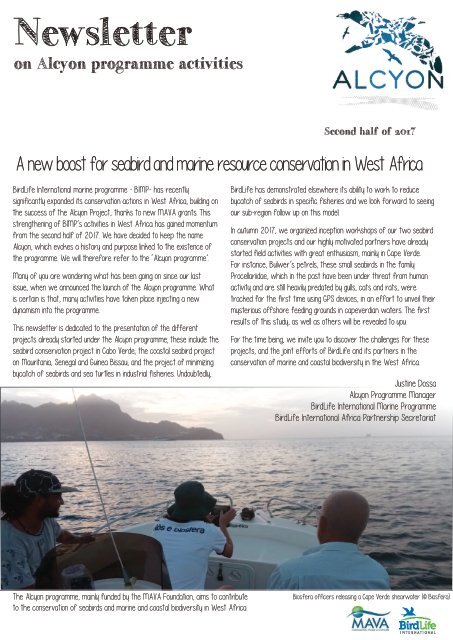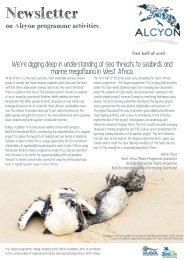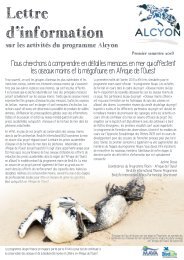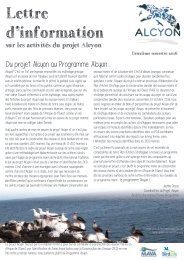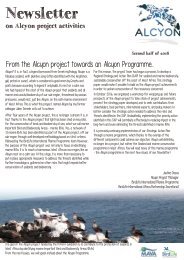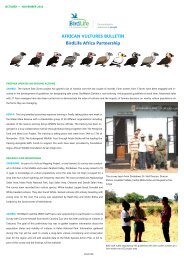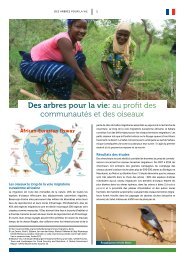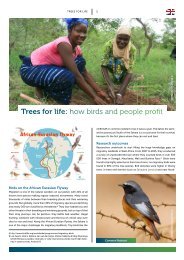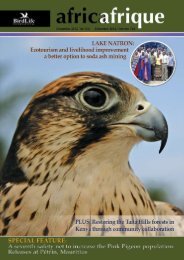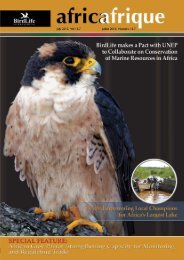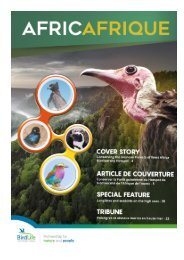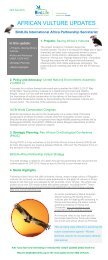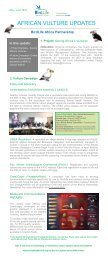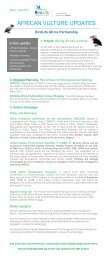ALcyon Newsletter-Jan 2018-Eng
Create successful ePaper yourself
Turn your PDF publications into a flip-book with our unique Google optimized e-Paper software.
<strong>Newsletter</strong><br />
on Alcyon programme activities<br />
Second half of 2017<br />
A new boost for seabird and marine resource conservation in West Africa<br />
BirdLife International marine programme - BIMP- has recently<br />
significantly expanded its conservation actions in West Africa, building on<br />
the success of the Alcyon Project, thanks to new MAVA grants. This<br />
strengthening of BIMP’s activities in West Africa has gained momentum<br />
from the second half of 2017. We have decided to keep the name<br />
Alcyon, which evokes a history and purpose linked to the existence of<br />
the programme. We will therefore refer to the ‘Alcyon programme’.<br />
Many of you are wondering what has been going on since our last<br />
issue, when we announced the launch of the Alcyon programme. What<br />
is certain is that, many activities have taken place injecting a new<br />
dynamism into the programme.<br />
This newsletter is dedicated to the presentation of the different<br />
projects already started under the Alcyon programme; these include the<br />
seabird conservation project in Cabo Verde, the coastal seabird project<br />
on Mauritania, Senegal and Guinea Bissau, and the project of minimizing<br />
bycatch of seabirds and sea turtles in industrial fisheries. Undoubtedly,<br />
BirdLife has demonstrated elsewhere its ability to work to reduce<br />
bycatch of seabirds in specific fisheries and we look forward to seeing<br />
our sub-region follow up on this model.<br />
In autumn 2017, we organized inception workshops of our two seabird<br />
conservation projects and our highly motivated partners have already<br />
started field activities with great enthusiasm, mainly in Cape Verde.<br />
For instance, Bulwer’s petrels, these small seabirds in the family<br />
Procellariidae, which in the past have been under threat from human<br />
activity and are still heavily predated by gulls, cats and rats, were<br />
tracked for the first time using GPS devices, in an effort to unveil their<br />
mysterious offshore feeding grounds in capeverdian waters. The first<br />
results of this study, as well as others will be revealed to you.<br />
For the time being, we invite you to discover the challenges for these<br />
projects, and the joint efforts of BirdLife and its partners in the<br />
conservation of marine and coastal biodiversity in the West Africa.<br />
Justine Dossa<br />
Alcyon Programme Manager<br />
BirdLife International Marine Programme<br />
BirdLife International Africa Partnership Secretariat<br />
The Alcyon programme, mainly funded by the MAVA Foundation, aims to contribute<br />
to the conservation of seabirds and marine and coastal biodiversity in West Africa<br />
Biosfera officers releasing a Cape Verde shearwater (© Biosfera)
Promoting the conservation of Cabo<br />
Verde seabirds<br />
This 2,5 years project, funded by MAVA Foundation, is in<br />
partnership with the Nacional Directorate for the Environment of<br />
Cabo Verde (DNA), Biosfera I, Projecto Vitó, Sociedade Portuguesa<br />
para o Estudo das Aves - SPEA (BirdLife partner in Portugal) and<br />
the University of Barcelona. A number of other local organisations<br />
including Amigos do Calhau, Associação Projeto Biodiversidade, BIOS.<br />
CV, Fundação Maio Biodiversidade, Instituto Nacional de Investigação<br />
e Desenvolvimento Agrário, Lantuna, the University of Cabo Verde<br />
and the University of Coimbra (Portugal) also play a key role in<br />
the project. Building on recent initiatives of external researchers<br />
and the Alcyon project, this project will determine the status of<br />
Cabo Verde’s seabirds, especially their distribution and threats<br />
both at their breeding sites and at sea, thence work together<br />
to mitigate key threats and build a wide interest and pride in<br />
seabirds. Throughout, building capacity will be a key theme of the<br />
project, with local PhD and MSc students supported as well as field<br />
assistants, protected areas staff and tour guides. These steps and<br />
close involvement with the main government partner will help build<br />
seabird conservation into national structures and plans.<br />
During the breeding season of 2017 Bulwer’s petrels were tracked<br />
for the first time in capeverdian waters in an effort to unveil their<br />
mysterious feeding grounds. These stunning birds seem to tend to<br />
forage in the waters south of Cabo Verde doing amazing flights<br />
to feed their chicks as revealed by preliminary tracking data. At<br />
the same time their nests were monitored to assess for breeding<br />
success and threats. But this is not just about Bulwer’s petrels. As<br />
part of this project, all the other breeding seabird species found in<br />
Cabo Verde are being studied, monitored and protected in a number<br />
of colonies by dedicated teams of local, national and international<br />
organisations.<br />
Deployment of a GPS logger in a Bulwer’s petrel (© Biosfera)<br />
New boat of Biosfera to support conservation actions (© Biosfera))<br />
For the first time a nationwide project coordinated by BirdLife<br />
International in close relation with DNA, aims at changing the fate<br />
of the internationally important seabird populations that inhabit the<br />
islands of the Cabo Verde archipelago.<br />
Tracking of a Bulwer’s petrel from Ilhéu de Cima in Cabo Verde during<br />
the chick rearing period (© University of Barcelona)
Conservation of coastal seabirds<br />
along the West African coast<br />
This project aiming at conserve West Africa’s impressive colonies<br />
of terns and gulls, will build on results of the previous Alcyon project<br />
and is coordinated by BirdLife International in partnership with<br />
a number of national NGOs and Governmental institutes (Nature<br />
Mauritanie and PNBA in Mauritania; NCD, Nébéday and DPN in<br />
Senegal; ODZH and IBAP in Guinea-Bissau), including the PRCM and<br />
national and international universities and research institutes. Over<br />
2,5 years, MAVA Foundation funds the project activities in an<br />
effort to improve management of coastal Marine Protected Areas<br />
and other priority sites, especially to guide the wise and long-term<br />
management of breeding colonies. This will include stepping up<br />
surveillance and build awareness about the values of gulls and terns,<br />
whilst also investing in ecotourism initiatives through a regional<br />
strategy and site-based interventions targeting local communities.<br />
On mid-December 2017 about 40 experts from 13 organisations<br />
met close to Dakar to attend the kick-off workshop of this new<br />
challenging project. This event was an occasion to meet all partners<br />
and to discuss about project activities and best approach. During the<br />
workshop partners had the opportunity to better understand their<br />
role in the project and to discuss the best means to work together<br />
towards the implementation of the activities. A number of PhD and<br />
Master students, field assistants, protected areas staff and tour<br />
guides will be involved and trained throughout the project along with<br />
Civil Society Organisations.<br />
Minimising bycatch of seabirds<br />
and turtles in industrial fisheries<br />
In November 2017, MAVA approved the seabirds and sea turtles<br />
bycatch project, which pleased many in the ranks of BirdLife’s<br />
West African and external partners who pledged to fight for<br />
the cause. This 2.2-year project coordinated by BirdLife in seven<br />
countries of West Africa from Mauritania to Sierra Leone including<br />
Cabo Verde.<br />
Participants attending the project inception workshop (©M.Lecoq)<br />
Colony of royal tern on ‘Ile aux Oiseaux’ in National Park of Saloum Delta (© J. Dossa)<br />
Thus, together with the PRCM, the CSRP, stakeholders from<br />
the fisheries departments of the 7 countries (DPM,DPSP-<br />
Sénégal; DGERH, DARE - Mauritanie; DNA, DGRM - Cap Vert; DGPI<br />
- Guinea Bissau, Fisheries Departments - Gambie & Sierra Leone);<br />
oceanographic research institutes and local universities; associations<br />
of ship-owners and fisheries Industries; with the collaboration of<br />
international universities and external partners such as NOAA,<br />
UNEP-CMS and IRD to name just a few, BirdLife will try to shed<br />
light on the nature and extent of bycatch risks for seabirds and<br />
sea turtles in West Africa.<br />
Flock of seabird following a fishing vessel off the coast of Senegal (© B. Van Gemerden)
As such, the project will ensure that knowledge is collectively<br />
generated and shared with key stakeholders, which will allow for risk<br />
analysis, bycatch baseline data and status assessment, an important<br />
step in identifying mitigation measures. Emphasis will be placed on the<br />
collection of data at sea by trained observers who will be trained<br />
in the project. Capacity building remains a key component of this<br />
project as it is in all other projects: local universities will participate<br />
in research and integrate the ecosystem approach to fishing into<br />
curricula. Several Master and PhD students will be trained as part of<br />
this project. At the same time, a review of the legislation will allow<br />
the project to improve and validate recommendations to minimize<br />
bycatch. For this reason, the project will initiate mechanisms to<br />
ensure that best practices are mandatory in national regulations<br />
through national, regional and international legal frameworks and the<br />
development of new legislation.<br />
For the first time in our sub-region, quantified information (by fleet,<br />
type of fishing gear and area) will be available on the bycatch rates<br />
of these two species in industrial fisheries with a view to motivating<br />
coordinated efforts to address this issue in our sub-region.<br />
Certainly, influencing international and regional conservation policies<br />
is vital, and BirdLife works with regional fisheries management<br />
organizations around the world to reduce bycatch in fishries. BirdLife<br />
also works with fishermen and other stakeholders to find and<br />
implement appropriate measures to prevent unnecessary mortalities<br />
of seabirds in fisheries. Unquestionably, the bycatch project is a<br />
unique point of entry for long-term integration of seabirds and<br />
ecosystem-based fisheries management, which, if implemented<br />
properly and sustainably, will have significant benefits for the West-<br />
African populations, their economies and the environment in general.<br />
Shearwaters feeding at sea off the coast of Senegal (© M.Lecoq)<br />
Improving knowledge for better<br />
management of offshore oil and<br />
gas activities in West Africa<br />
Significant new oil and gas reserves are being discovered in our<br />
sub-region, with relatively low environmental capacity to monitor<br />
and control standards, legal compliance and pollution risks.<br />
BirdLife is involved in the implementation of the research and<br />
monitoring strategy of the MAVA-funded Oil and Gas project<br />
coordinated by IDDRI. BirdLife, in close collaboration with local<br />
research institutes in the sub-region, Fauna and Flora International<br />
(FFI), the UNEP World Conservation Monitoring Centre (WCMC),<br />
the Abidjan Convention and other agencies with a proven<br />
track record, will provide all necessary data and tools to better<br />
understand and manage the risks associated with the oil and gas<br />
industry in order to avoid sensitive areas, and to better plan and<br />
carry out pollution risk monitoring.<br />
Upcoming events<br />
21st February <strong>2018</strong>, Dakar, Senegal: Inception workshop of the Oil and Gas Project<br />
BirdLife will soon be recruiting technical assistants for its various Alcyon projects and the Bycatch project team.<br />
Vacancy announcements will soon be posted on the BirdLife website<br />
For more information :<br />
Justine Dossa<br />
Alcyon Programme Coordinator<br />
justine.dossa@birdlife.org<br />
www.birdlife.org<br />
Miguel Lecoq<br />
Seabird Projects Manager<br />
miguel.lecoq@birdlife.org


